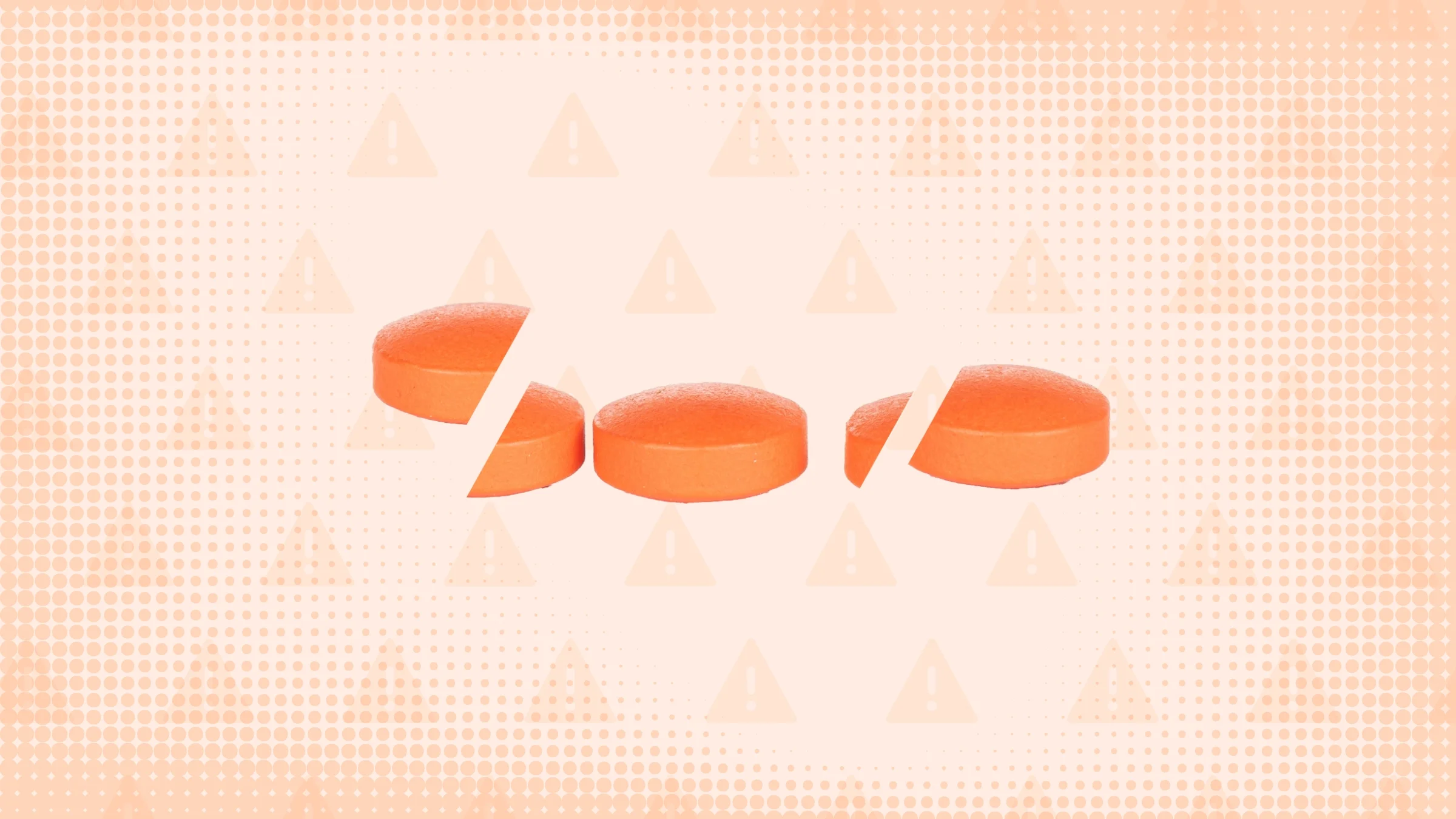Key takeaways:
Auvelity is a fast-acting antidepressant that contains two active ingredients, dextromethorphan and bupropion.
Auvelity is generally well tolerated, but it can occasionally cause side effects. The most common Auvelity side effects include dizziness and an upset stomach. Other mild side effects are headache and dry mouth.
High blood pressure, seizures, and hallucinations are rare but serious side effects of Auvelity. As with other antidepressants, Auvelity has a boxed warning concerning the risk of suicidal thoughts and behavior.
Save on related medications
Depression can deeply affect daily life. Fortunately, many treatment options are beneficial in helping manage mood changes, a lack of motivation, and other symptoms.
One newer oral antidepressant medication is Auvelity. This extended-release tablet contains two active ingredients, dextromethorphan and bupropion, and is fast acting. Auvelity’s effects can be felt within 1 week of starting the medication. By comparison, it often takes 4 to 8 weeks to feel the effects of many other antidepressants. Also, unlike other fast-acting antidepressants, which are typically given in a medical setting, Auvelity can be taken at home.
Although Auvelity may sound like an ideal medication, it’s important to remember that it can cause side effects. Let’s discuss these more in depth.
Auvelity side effects at a glance
Auvelity is generally well tolerated. Most of its side effects are rated as mild to moderate in severity. These side effects typically improve over time as your body gets used to the medication.
Milder Auvelity side effects include:
Dizziness
Nausea
Diarrhea
Constipation
Headache
Dry mouth
Anxiety
Fatigue
Decreased appetite or changes in body weight
Joint pain
Increased sweating
Sexual changes
Rare but serious side effects can also occur when you’re taking Auvelity:
Elevated blood pressure
Seizures
Hallucinations
Complications from glaucoma
Serotonin syndrome
Suicidal thoughts
Here’s more information about eight Auvelity side effects to keep in mind.
1. Dizziness
Dizziness is the most commonly reported side effect of Auvelity. About 16% of people in the medication’s initial studies experienced it.
If you start to feel dizzy, find a safe space to sit or lie down until the dizziness passes. And don’t plan on driving a car after taking Auvelity until you know how it makes you feel.
Dizziness is a common sensation that can be caused by a number of factors — not just medication. Talk to your healthcare professional (HCP) if you’re concerned about dizziness while taking Auvelity.
2. Upset stomach
An upset stomach can occur while taking Auvelity. You may develop nausea, diarrhea, or a smaller-than-normal appetite. Constipation could also happen. Fortunately, there are several things you can do to help minimize feeling sick to your stomach.
One simple but helpful way to address these symptoms is to drink plenty of water. The amount of water you need daily depends on many factors, but in general, you’re getting enough water if you’re drinking fluids when you feel thirsty. Keeping a log or marking a water bottle can be helpful to keep track of your intake. You can also try electrolyte drinks, which help replenish water and other electrolytes you may be losing.
Temporarily changing your diet or the timing of when you take your medication may also help improve an upset stomach. For instance, avoiding spicy and fried foods and sticking to bland foods, such as the BRAT diet (bananas, rice, applesauce, and toast), can help minimize feeling sick. And taking Auvelity with food can help prevent getting an upset stomach in the first place.
3. Headache
Headaches are another common side effect of Auvelity. Headaches usually last for a few hours but can be painful and greatly affect your day.
Fortunately, several home remedies can help alleviate headaches. Making small lifestyle changes — staying hydrated, reducing stress (when possible), getting enough exercise — are great starting points. Avoiding dietary triggers is another decision to consider. Certain foods, including those with nitrites and aspartame, have been linked to an increased risk of headaches. Alcohol can trigger headaches too.
Many over-the-counter (OTC) medications can treat headaches if these other options don’t help. Popular OTC headache medications include acetaminophen (Tylenol), ibuprofen (Advil, Motrin), and aspirin. Your HCP can tell you which options are the safest for you to try.
If you’re unsure what is triggering your headaches, or the best way to manage them, talk to your HCP. There are many causes of headaches, including other medications.
4. Dry mouth
Dry mouth is another common complaint about many medications. In fact, medications are considered a top cause of dry mouth. This includes Auvelity in some cases.
A dry mouth is uncomfortable. It can also cause bad breath and make it harder to eat and speak. Long-term effects of dry mouth include an increased risk of dental decay and mouth infections.
There are many home treatments that can help combat dry mouth:
Drinking cool liquids: Drinking at least 8 cups of chilled water (or another sugar-free drink) each day can help manage dry mouth. Sucking on ice chips or sugar-free hard candy also helps. But try to avoid caffeinated beverages, which tend to worsen dry mouth.
Chewing sugar-free gum: Most types of gum can increase saliva production. This is because they contain xylitol. But choose a sugar-free gum, which won’t contribute to cavity formation.
Trying saliva substitutes, such as Biotene: These products help fight dry mouth and prevent dental decay. They provide nutrients and proteins found in saliva. Research hasn’t found which one works best, so choose one based on your preference.
Taking care of your mouth on a daily basis won’t relieve dry mouth right away. But it reduces your risk of dental decay and mouth infections. Maintaining good oral hygiene consists of habits such as brushing your teeth with a fluoride toothpaste, flossing twice daily, and rinsing with an alcohol-free mouthwash. Be sure to see your dentist regularly for cleanings as well.
If your dry mouth isn’t getting better, ask your HCP about other options to manage your symptoms.
5. Elevated blood pressure
Some people taking Auvelity experience higher blood pressure readings. This is linked to the bupropion component of the medication, most likely because of its effect on a chemical in the brain called norepinephrine.
Before you start taking Auvelity, your HCP should check your blood pressure. They’ll likely monitor it regularly while you’re taking Auvelity to be sure it doesn’t get too high. But if you have preexisting hypertension (high blood pressure), your prescriber may recommend trying a different antidepressant.
6. Seizures
The bupropion component of Auvelity is also sometimes linked to seizures. This risk of seizures is believed to go up as the dose of bupropion increases. This is why Auvelity doses are increased slowly over time — to be sure the medication is well tolerated as you approach the recommended daily dose.
A person’s seizure risk also depends on many other factors, including other medications you’re taking and health conditions you may have. Because the risk of seizures varies person to person, it’s important to discuss your risk with your HCP before starting Auvelity.
7. Hallucinations
Hallucinations, delusions, and psychosis are possible while taking Auvelity. Symptoms of these side effects may include:
Suspicion or paranoia
Isolating yourself from others
Having strange or odd ideas
Appearing to lack emotion
Confusion during speech and conversation
Hearing or seeing things that aren’t actually there
These symptoms can occur during treatment with Auvelity and after it’s stopped. If you believe you are experiencing these symptoms, talk to your HCP right away. They can walk you through the next steps.
8. Suicidal thoughts
Auvelity, as with other antidepressants, has a boxed warning concerning the risk of suicidal thoughts and behaviors. A boxed warning is the FDA’s strictest warning about medication-related risks.
This risk has been found to be highest among people ages 24 and younger. But the actual risk varies based on the antidepressant being taken. Still, it’s recommended to monitor your mood while taking Auvelity — especially during the first few months of taking it and after any dose increases.
For additional resources or to connect with mental health services in your area, call the Substance Abuse and Mental Health Services Administration’s National Helpline at 1-800-662-4357. For immediate assistance, call the National Suicide Prevention Lifeline at 988, or text HOME to 741-741 to reach the Crisis Text Line.
When to contact your healthcare professional about Auvelity side effects
Swift and proactive communication is essential to managing Auvelity side effects. Get in touch with your HCP without delay if you’re experiencing Auvelity side effects that are bothersome, don’t go away, or are worsening.
Changes in mood and suicidal thoughts should be addressed more immediately. Seek emergency medical attention or call the National Suicide Prevention Lifeline at 988 right away if you are experiencing suicidal thoughts or behaviors.
The bottom line
Auvelity (dextromethorphan / bupropion) is a fast-acting antidepressant that’s safe and generally well tolerated. But as with any medication, side effects are possible. Mild Auvelity side effects include dizziness, upset stomach, and headache. Dry mouth can also occur. Rare but serious side effects include elevated blood pressure, hallucinations, and seizures. Auvelity may also cause suicidal thoughts and behaviors. If you experience bothersome or worsening side effects while taking Auvelity, tell your HCP without delay.

Why trust our experts?



References
Axsome Therapeutics. (2022). Auvelity- dextromethorphan hydrobromide, bupropion hydrochloride tablet, multilayer, extended release [package insert].
Bots, C. P., et al. (2004). Preferences and saliva stimulation of eight different chewing gums. International Journal of Dentistry.
Dehghanmehr, S., et al. (2017). Investigating the effect of sugar-free candies on the intensity of thirst and dry mouth in patients undergoing hemodialysis.
Endocrine Society. (2022). Adrenal hormones.
McCarthy, B., et al. (2023). Dextromethorphan-bupropion (Auvelity) for the treatment of major depressive disorder. Clinical Psychopharmacology Neuroscience.
Oh, C. Y., et al. (2012). Lowering the seizure threshold associated with antidepressants, stimulants, antipsychotics, and others. Mental Health Clinician.
Shahdad, S. A., et al. (2005). A double-blind, crossover study of Biotène Oralbalance and BioXtra systems as salivary substitutes in patients with post-radiotherapy xerostomia. European Journal of Cancer Care.











